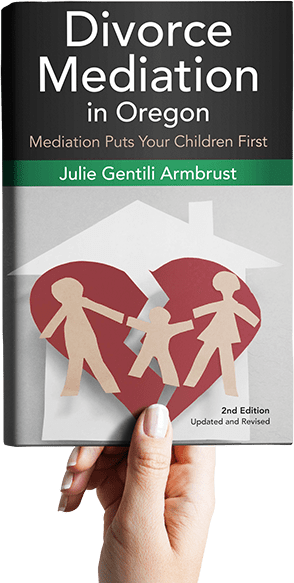The mediator is responsible for structuring the discussion so that all issues are addressed in a fair and constructive manner. Think of a mediator as a master negotiator whose sole job is to recognize and utilize different communication and negotiation tools to assist parties in reaching a mutually acceptable agreement. A mediator may meet with the parties together, which is called a joint session, or separately, which is called a private session.
Mediation Northwest
Frequently Asked Questions
What is divorce mediation?
Divorce mediation is a process where a couple meets with an impartial third party – the mediator. The mediator does not make the decisions – the parties do.
What are the Advantages and Disadvantages of Mediation?
Mediation provides the parties with control over the outcome of their dispute. Mediation is very cost effective.
Mediation, however, is not appropriate for everyone. For those who are not able to negotiate on their own behalf and are confused by the subject matter, mediation may not be the appropriate process to resolve the dispute.
Is Mediation Binding?
Mediation can be binding when the final settlement agreement is reduced to writing and signed by the parties.
Mediation, however, is not appropriate for everyone. For those who are not able to negotiate on their own behalf and are confused by the subject matter, mediation may not be the appropriate process to resolve the dispute.
Is Mediation Cost Effective?
Yes! Generally, parties can reduce their overall costs by two-thirds! And, studies show that mediated agreements are followed approximately 85% of the time versus only 55% of the time for judge-rendered decisions.
Therefore, parties who choose to mediate not only save a lot of money, they ensure the highest level of satisfaction and follow-through with the agreement! Parties spend FAR less in mediation than hiring two sets of attorneys!
Who Should Not Mediate?
In order to be successful in mediation, both parties need to have the ability to make decisions together.
If parties lack the ability to make mutually agreeable decisions, not only will mediation fail, but the parties will have spent a lot of money without any resolution to the problem. Additionally, parties who cannot be truthful or trustworthy are not successful in mediation.
How Can I Get a Divorce Through Mediation?
First, the mediator assists the parties in negotiating all issues pertaining to the divorce including: asset allocation, debt allocation, spousal support, custody, parenting time, and child support.
Then, upon reaching a settlement on all issues, the mediator drafts a Mediation Settlement Agreement, which is called an MSA. At this time, the parties are encouraged to seek independent legal advice to review and advise each party regarding the terms of the MSA. Upon each party agreeing to the final terms of the MSA, the mediator files all documents necessary to legally effectuate your divorce.
How Do I Make an Appointment?
First, both parties must agree to use Mediation Northwest to mediate their divorce. We require both parties to contact us individually so we may have a brief conversation about each party’s perspective of the issues involved in divorce.
If both parties agree to use Mediation Northwest and if Mediation Northwest determines you are an appropriate fit for our us, then we schedule an appointment to mediate. Generally, a two-hour appointment is scheduled, but parties only pay for the time they actually use. So, if you only mediate for 30 minutes, you only pay for 30 minutes.
How Is My Attorney Involved?
Mediation Northwest encourages its clients to seek independent legal advice at any stage of the mediation process.
Furthermore, independent legal advice is most helpful before the first mediation session and after receiving the first draft of the Mediation Settlement Agreement. Parties are encouraged to ask their attorney about the asset and debt division, spousal support, health insurance, custody, parenting time, and child support.
I have (or will soon) inherited money. How is that handled?
Inheritance received during the marriage and maintained in a separate account is presumed to be a non-marital asset, but can be determined to be marital by the parties or by a judge.
How much spousal support can I expect to pay/receive?
Spousal support is available when party A earns substantially more income than party B if party B doesn’t earn enough to live the life s/he has grown accustomed to living.
However, unlike child support, which is calculated by a nifty calculator, spousal support is not calculated but negotiated. How Much. The amount of the spousal support award depends upon many factors, including each party’s income, either party’s opportunity for advancement in his/her profession, the age of the parties, the budgetary needs of each party, and the length of the parties’ marriage.
How Long. The length of the spousal support award is also dependent upon length of the marriage, either party’s opportunity to advance in his/her profession, the budgetary needs of each party, and the age of the parties.
How much child support can I expect to pay/receive?
The Oregon Child Support Division offers a calculator to determine child support.
Some parties find this calculator easy to use; others find the multitude of options difficult. Oregon law requires all divorcing parties with children 20 years and younger to calculate child support and advise the court of the calculated amount of child support, which is called the presumed amount of child support.
If I leave the house during the separation, will I be giving-up a right to the house?
Your attorney will tell you that if you leave the house, you are giving-up the opportunity to be awarded the house in the divorce.
However, in mediation, parties generally get along. If you know you don’t want the house, but only want the equity from the house, then you can move out of the house. If you want the house and aren’t in agreement with your soon-to-be ex about who will take the house, then stay put.
I want to keep my retirement. Does s/he have a right to it?
If retirement was earned during the marriage, then your soon-to-be ex has an equity right to the retirement, which doesn’t necessarily mean half of the retirement.
To explain, every asset and liability of the marriage is assigned a value. Most couples in mediation want to walk away with half of the overall value of the marital assets and liabilities. So, you may keep 100% of your retirement if your soon-to-be-ex keeps the same amount of equity in the house.

Divorce without Drama is the perfect guide for anyone facing a divorce and the roller-coaster “year of chaos” that follows.
In Divorce without Drama, you’ll be shown step-by-step methods for valuing and dividing of assets/liabilities, tips on retirement accounts, how to handle child and spousal support, and suggestions for custody and parenting time schedules for children. Julie’s direct approach is a quick read that tells you what you need to know to take care of yourself and your family in this difficult time.


